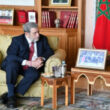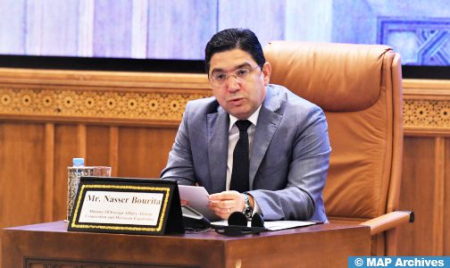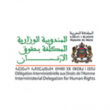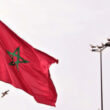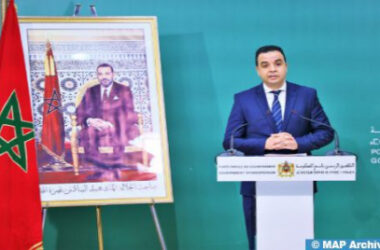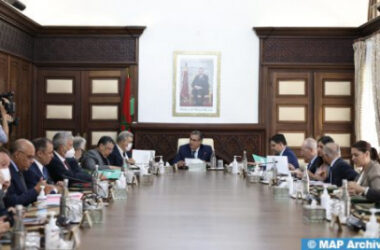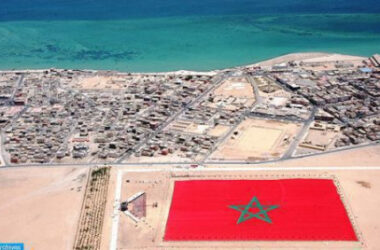In a speech on the occasion of the ministerial meeting of the Peace and Security Council (PSC) of the African Union (AU) on national reconciliation in Libya, Bourita said that the “position of the Kingdom of Morocco on the Libyan issue remains constant and clear,” considering Libya as “a key partner in the construction of the Maghreb space and the achievement of the aspirations of the peoples of the Maghreb to integration and development”.
The Kingdom of Morocco renews its support to the efforts made by the Libyan Presidential Council and by His Excellency Denis Sassou-Nguesso, President of the Republic of Congo and Chairman of the African Union High Level Committee on Libya, in order to hold a comprehensive conference for national reconciliation in Libya, he stressed in this speech read on his behalf by the director of the Middle East, the Gulf and Arab and Islamic Organizations, Fouad Akhrif.
In accordance with the High Royal Directives of His Majesty King Mohammed VI, the Kingdom of Morocco has been one of the first to accompany the efforts made by the Libyan parties to overcome the delicate transition phase that sister Libya is going through, with the aim of achieving its aspirations to build a democratic state, united and unified in its sovereignty, territory and national cohesion, he added.
In this sense and since the beginning of the crisis, he added, Morocco is committed with determination and dynamism in international and regional efforts to reconcile the Libyan parties and facilitate their efforts to find a consensual solution, always calling for the adoption of a comprehensive approach, based on dialogue and consensus, to build a State of institutions.
The Kingdom of Morocco – King, government and people – stands by the brotherly Libyan people, stresses at every opportunity the need to preserve the national unity and territorial integrity of the Libyan state and considers the adoption of a national dialogue, with the participation of all components of the Libyan people as the only way to reach this stage, underlined Bourita.
The Kingdom of Morocco has worked, in this regard, as part of its ongoing efforts to resolve the Libyan crisis, to bring together the views of the various Libyan parties, opening dialogue between them and creating a conducive atmosphere, betting that the solution can only be Libyan and political and that the difficulties will be overcome through a calm dialogue and promoting the primacy of Libyan interests.
Morocco has also continued its efforts to bring the views of the Libyan parties closer together, by receiving Libyan political actors and officials, as well as the UN envoy and the envoys of countries and organizations in charge of the Libyan question. This issue has also been at the center of Morocco’s political consultations in the context of bilateral, regional and international meetings, during which it sought to press for a political solution to the issue and to avert the spectre of military intervention or civil war, he recalled.
Morocco has continued its efforts, building on previous experience – from which the Skhirat political agreement has emerged since 2015, to contribute to the resolution of the Libyan conflict based on its approach of providing Libyans with an appropriate space for dialogue and constructive consultation, he said, adding that Morocco was the first country to bring together representatives of the House of Representatives and the High Council of State in Bouznika and Tangier in late 2020, with the aim of reaching a consensus on the controls, mechanisms and criteria for accession to the seven regalian functions, which is one of the essential elements of the unification of institutions.
In the same context, during the reception of Abdoulaye Bathily, Special Representative of the Secretary-General for Libya and Head of the United Nations Support Mission in Libya, Morocco renewed its support for the efforts made by the UN mission to reach an agreement with the Libyan parties to hold presidential and parliamentary elections.
Rabat had also hosted, on October 21, 2022, a meeting between Aguila Saleh – Speaker of the House of Representatives, and Khaled Al-Mishri – President of the High Council of State, on the implementation of the results of the Bouznika process and the unification of executive power.
This meeting was welcomed by members of the UN Security Council, which considered it an important step that contributes to the rapprochement of the Libyan parties, according to the same source.
The Kingdom of Morocco believes that reaching a consensual and comprehensive legislative framework for elections in Libya, under the aegis of the United Nations, is the only way to achieve lasting peace, and the holding of elections as soon as possible is the guarantee for the formation of a legitimate and elected government. In this regard, we hope that the National Reconciliation Conference, which the African Union and the Libyan Presidential Council intend to organize in Tripoli, will be an opportunity to strengthen the consensus between the Libyan parties.
Pursuant to the High Royal directives, Morocco confirms its permanent determination and readiness to accompany the national reconciliation in Libya, in the same spirit and with the same approach which draws its credibility from the Kingdom’s firm adherence to the respect of the Libyans’ will without any other agenda, and rejecting any foreign interference aiming at imposing a guardianship and dictating solutions, the minister noted.
While the Kingdom of Morocco affirms that overcoming the crisis requires a comprehensive reconciliation based on the principles of transitional justice, Bourita welcomed the efforts of the Presidential Council to launch the process of national reconciliation and make the process of consensus among Libyans a success in order to establish state institutions and strengthen their capacity.
In this regard, the Kingdom of Morocco offers its expertise to our Libyan brothers in transitional justice, including the eminent experience of the Equity and Reconciliation Commission, he stressed.
From this point of view, the Kingdom of Morocco considers that separating the issue of national reconciliation from the political split and the struggle for influence and interests in Libya, without neglecting the role of the political settlement and the resolution of the legitimacy dilemma through legislative and presidential elections, as well as the unification of the military and security institutions are among the first steps to move this issue forward, in addition to continuing to renounce the hate speech that only exacerbate the current situation.
The Minister also praised the great interest that the African Union attaches to the Libyan issue and its tireless efforts to support the political process in Libya, aimed at strengthening the foundations of unity and stability in order to achieve the aspirations and hopes of the Libyan brotherly people.
While Libya has been experiencing relative stability for some time, especially following the efforts of various international and regional actors to find a solution to the legitimacy crisis in this sister country, the political and institutional division, especially in light of the presence of two parallel governments, limits the effectiveness of international efforts to provide an environment conducive to the holding of elections, which is “the only solution to resolve the problem of legitimacy in this brotherly Maghreb country,” he said.
The complex political and security situation in Libya is the result of the accumulation of internal conflicts and external interventions with different and contradictory agendas, which have contributed, for more than ten years, to widen the gap between the various components of Libyan society, especially tribal, political and military, which makes the Libyan reconciliation a priority and current issue for all of us and for our continental organization; concluded the minister.



